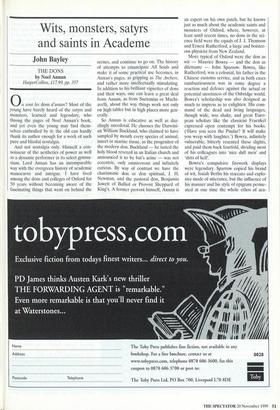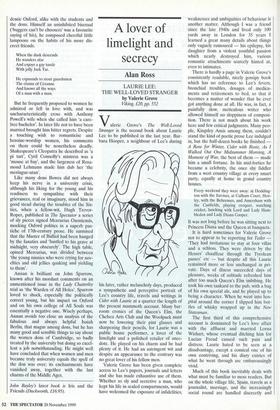Wits, monsters, satyrs and saints in Academe
John Bayley THE DONS by Noel Annan
HarperCollim, £17.99, pp. 357
u song les dons d'antan? Most of the young have barely heard of the satyrs and monsters, learned and legendary, who throng the pages of Noel Annan's book, and yet even the young may find them- selves enthralled by it; the old can hardly thank its author enough for a work of such pure and blissful nostalgia.
And not nostalgia only. Himself a con- noisseur of the aesthetics of power as well as a dynamic performer in its select gymna- sium, Lord Annan has an incomparable way with the evergreen history of academic manoeuvre and intrigue. I have lived among the dons and colleges of Oxford for 50 years without becoming aware of the fascinating things that went on behind the
scenes, and continue to go on. The history of attempts to emancipate All Souls and make it of some practical use becomes, in Annan's pages, as gripping as The Archers, and rather more intellectually stimulating. In addition to his brilliant vignettes of dons and their ways, one can learn a great deal from Annan, as from Suetonius or Machi- avelli, about the way things work not only on high tables but in high places more gen- erally.
So Annan is educative as well as daz- zlingly anecdotal. He chooses the Darwini- an William Buckland, who claimed to have sampled by mouth every species of animal, insect or marine tissue, as the progenitor of the modern don. Buckland — he tasted the holy blood revered in an Italian church and announced it to be bat's urine — was not eccentric, only omnivorous and infinitely curious. By way of contrast we have the charismatic don or don spiritual, J. H. Newman, and the pastoral don, Benjamin Jowett of Balliol or Provost Sheppard of King's. A former provost himself, Annan is an expert on his own patch, but he knows just as much about the academic saints and monsters of Oxford, where, however, at least until recent times, no dons in the sci- ence field were the equals of J. J. Thomson and Ernest Rutherford, a large and boister- ous physicist from New Zealand.
More typical of Oxford were the don as wit — Maurice Bowra — and the don as dilettante — John Sparrow. Bowra, like Rutherford, was a colonial, his father in the Chinese customs service, and in both cases rumbustiousness was in some degree a reaction and defence against the actual or potential snootiness of the Oxbridge world. Bowra's scholarship was also designed as much to impress as to enlighten. His com- mand of the dead and living languages, though wide, was shaky, and great Euro- pean scholars like the classicist Fraenkel expressed open contempt for his books. (`Have you seen the Pindar? It will make you weep with laughter.') Bowra, infinitely vulnerable, bitterly resented these slights, and paid them back fourfold, dividing most of his colleagues into `nice dull men' and `shits of hell'.
Bowra's compulsive firework displays were legendary. Sparrow copied his brand of wit, Isaiah Berlin his staccato and explo- sive mode of utterance, but the influence of his manner and his style of epigram perme- ated at one time the whole ethos of aca- demic Oxford, alike with the students and the dons. Himself an uninhibited bisexual ('buggers can't be choosers' was a favourite saying of his), he composed cheerful little lampoons on the habits of his more dis- creet friends.
When the dusk descends He wanders afar And enjoys a gay tussle With jolly Jack Tar.
He expounds to stout guardsmen The claims of Cdzanne And knows all the ways Of a man with a man.
But he frequently proposed to women he admired or fell in love with, and was uncharacteristically cross with Anthony Powell's wife when she called him 'a care- free bachelor'. In later life not to have been married brought him bitter regrets. Despite a touching wish to romanticise and heroine-worship women, his comments on them could be nonetheless deadly. Shakespeare's Cleopatra he described as 'a pi tart', Cyril Connolly's mistress was a 'mouse at bay', and the largeness of Rosa- mond Lehmann made him dub her 'the meringue-utan'.
Like many dons Bowra did not always keep his nerve in a university crisis, although his liking for the young and his readiness to sympathise with their grievances, real or imaginary, stood him in good stead during the troubles of the Six- ties, when a fellow-wit, Hugh Trevor- Roper, published in The Spectator a series of sly pieces signed Mercurius Oxoniensis, mocking Oxford politics in a superb pas- tiche of 17th-century prose. He surmised that the Master of Balliol had been hanged by the fanatics and 'hustled to his grave at midnight, very obscurely'. The high table, opined Mercurius, was divided between 'the young ninnies who were crying for nov- elties and old jellies quaking and yielding to them'.
Annan is brilliant on John Sparrow, known after his mordant comments on an unmentioned issue in the Lady Chatterley trial as 'the Warden of All Holes'. Sparrow loved to shock, especially the politically correct young, but his impact on Oxford and on his own college of All Souls was essentially a negative one. Wisely perhaps, Annan avoids too close an analysis of the fabulous and always helpful Isaiah Berlin, that magus among dons, but he has many good and sensible things to say about the women dons of Cambridge, so badly treated by the university but doing so excel- lent a job notwithstanding. He might well have concluded that when women and men became truly university equals the spell of the don was over; its enchantments have vanished away, together with the last charms of the Middle Ages.
John Bayley's latest book is Iris and the Friends (Duckworth, £16.95).



























































































 Previous page
Previous page